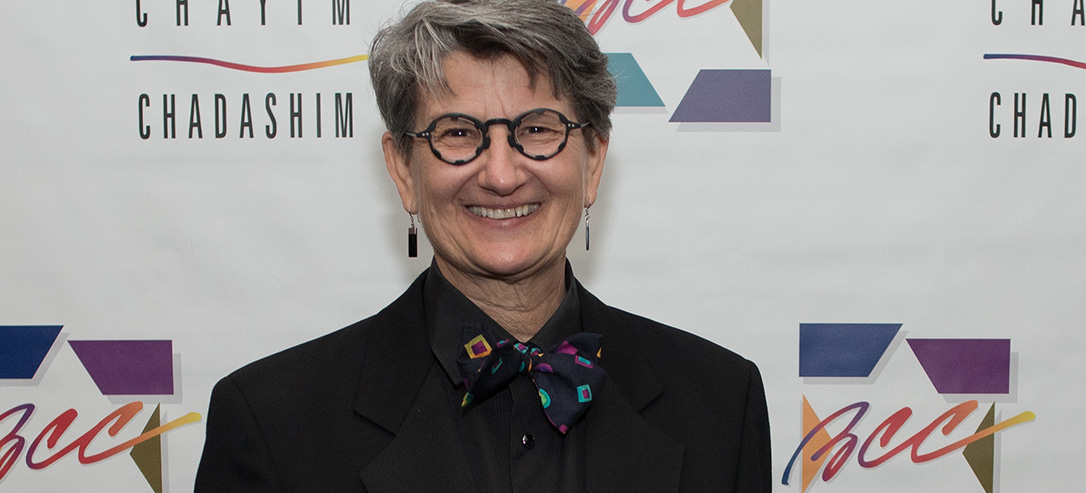Thoughts on Our New Musical Culture Awards

Excerpts* from Rabbi Lisa Edwards’ remarks at the Saban Theatre at our BCC@45 celebration, the day after her own birthday:
All eight of our honorees today are not only extraordinary; they are extraordinarily precious to me. So thanks for this great birthday present, everyone who had anything to do with today! What a super birthday party.
_______________
I wanted to take a moment now to say— from my new perspective at age 65, as well as from almost 23 years as rabbi at BCC — and that’s a lot of perspective — that our congregation has been blessed by the times we grew up in and the people who happened by, and these music makers we honor today are chief among them…
Whether we call it “pholkmusic” or women’s music or new Jewish music, the musical traditions represented by our honorees, and the music they create and propagate, really have both preserved and changed Jewish prayer, Jewish community, and LGBTQ community… What was once considered underground music created common ground, firming up the earth beneath us so that those of us considered “other” could come together to stand on solid ground.
In celebration of BCC’s 45th anniversary, we are proud today to be initiating this new award — the Musical Culture Award — in tribute to the music makers — these culture makers — who continue to help shape LGBTQ culture and our congregation…
As the world’s first synagogue created by gay and lesbian Jews, BCC is still today a haven and place of queer and Jewish culture making. The Musical Culture Award recognizes the music makers who bring spirit, soul, sanctity and culture to BCC and the LGBTQ Jewish community.
I want to take a moment first though to honor two other people special to BCC — Agnes Herman and Richard Lesse — who have helped anchor BCC and have helped it fly, enabling us in a variety of ways to reach out beyond our doors and bring people in. These two people, who came to BCC decades apart from each other, saw what unique gifts BCC has to offer as well as visions of what BCC could still become.
It was my idea to honor the musicians who have touched us so deeply because over my 23+ years at BCC I’ve become increasingly aware that much of our identity as a queer and Jewish community comes by way of the musicians we’ve known and loved. So much of BCC is of their making and by their design.
A 19th century Rabbi wrote: “The inner history of a people is contained in its song.”— Austrian Rabbi Adolf Jellinek, Der Orient (1844).
And while I don’t know exactly what that rabbi meant by “inner history,” I know what it means to me about a community and a people that lived closeted for so long, whose inner life was seldom shared until musical movements — women’s music, folk music — helped to bring us out, leading the way to all kinds of music of the soul — guitars in the synagogue, prayers sung in English, folk music about being queer or Jewish or both, Purim spiels and popular songs bringing humor and love to our lives in bold new ways…
Toward the end of the concert, just before the awards were presented:
See why we wanted to honor these folks? We do have something for each of you to take with you today: these plaques, each with a mezuzah case decorated with musical notes, with a copy of BCC’s own special
mezuzah scroll inside, and these words on each plaque:
Music is the doorway to the soul, And the singer its mezuzah.
A mezuzah is that artful object that hangs in the doorway of a Jewish home. It contains a prayer, as the Torah tells us, “Inscribe these words on the doorposts of your house, that you might remember.”
So what might it mean for a singer to be a mezuzah? Perhaps that a maker of music serves — like a mezuzah — not only as a work of art, but as a guardian, a reminder, an Invitation, a touchstone. Blessed are you, sweet singers, all of you who, with your gifts of music and soul, preserve our past, celebrate our present, open doors to our future.
May your music always bring us together!
___________________________
*This article was first published in G’vanim, May-June 2017 issue




